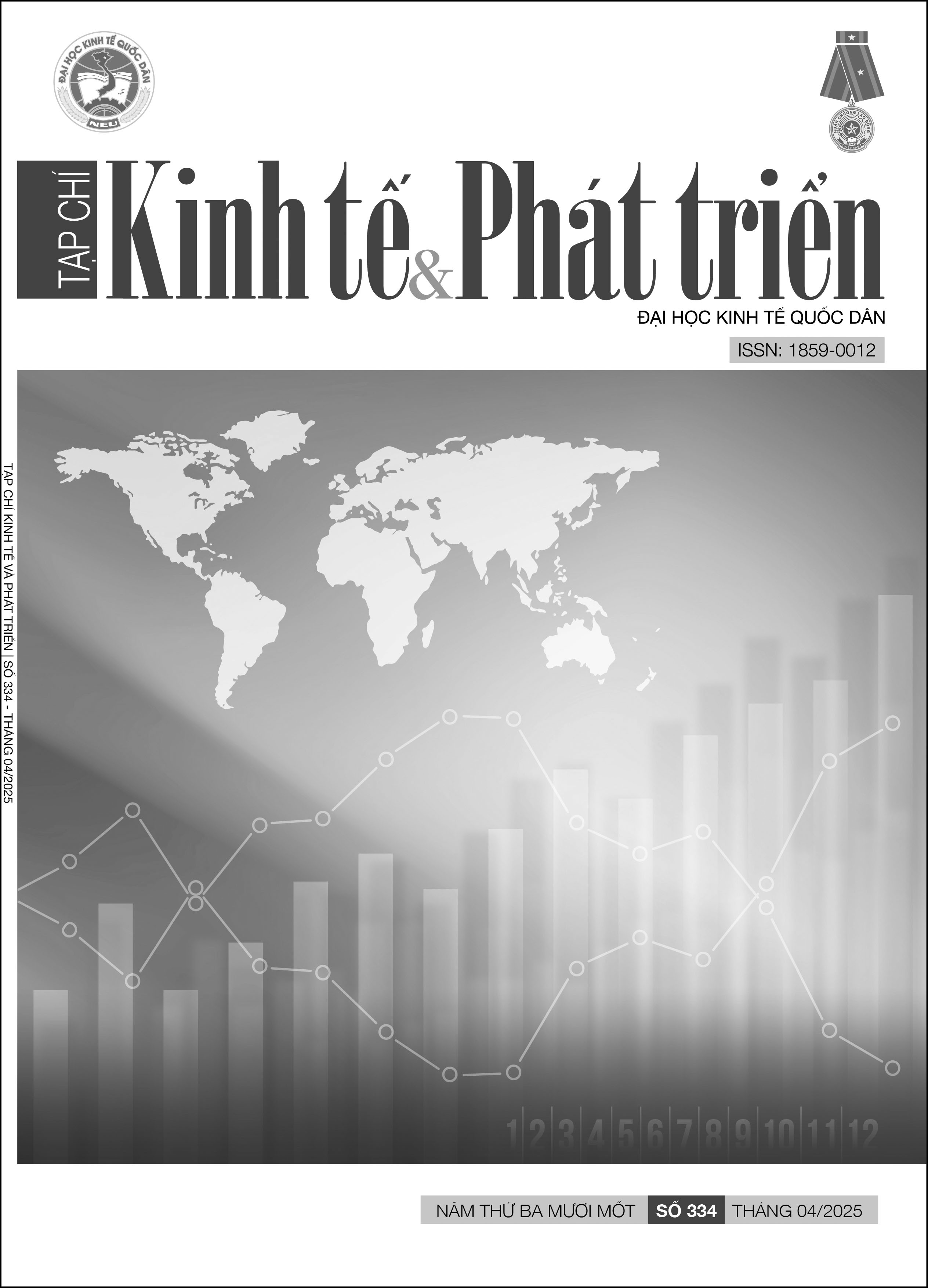Tiêu dùng năng lượng tái tạo, tham nhũng, và tăng trưởng kinh tế ở các quốc gia Châu Á
DOI:
https://doi.org/10.33301/JED.VI.2263Từ khóa:
Châu Á, Tham nhũng, Tăng trưởng kinh tế, Tiêu dùng năng lượng tái tạoTóm tắt
Chuyển đổi sang năng lượng tái tạo, phòng chống tham nhũng và phát triển bền vững đang nhận được sự quan tâm của giới nghiên cứu và quản lý thực tiễn, nhưng mối quan hệ giữa các yếu tố này còn chưa nhất quán. Nghiên cứu này xem xét tác động của tiêu dùng năng lượng tái tạo và tham nhũng tới tăng trưởng kinh tế thông qua sử dụng mô hình GMM động với số liệu thu thập từ 36 quốc gia châu Á trong thời gian 2010 đến 2021. Kết quả ước lượng cho thấy tăng tiêu dùng năng lượng tái tạo và kiểm soát tham nhũng tốt hơn sẽ thúc đẩy tăng trưởng kinh tế. Đồng thời, quốc gia kiểm soát tham nhũng tốt hơn khiến tác động tích cực của tiêu dùng năng lượng tái tạo tới tăng trưởng mạnh hơn. Kết quả thực nghiệm này ngụ ý rằng việc chuyển đổi năng lượng tái tạo và phòng chống tham nhũng là giải pháp đảm bảo thực hiện thành công mục tiêu phát triển bền vững của quốc gia.
Tài liệu tham khảo
Acemoglu, D., & Robinson, J. (2010). The role of institutions in growth and development. Review of Economics and Institutions, 1(2), 1-33.
Alper, A., & Oguz, O. (2016). The role of renewable energy consumption in economic growth: Evidence from asymmetric causality. Renewable and Sustainable Energy Reviews, 60, 953-959.
Apergis, N., & Payne, J.E. (2010). Renewable energy consumption and economic growth: Evidence from a panel of OECD countries. Energy Policy, 38, 656–660.
Arellano, M., & Bond, S. (1991). Some tests of specification for panel data: Monte Carlo evidence and an application to employment equations. Review of Economic Studies, 58(2), 277-297.
Aslan, A., Ocal, O., Ozsolak, B., & Ozturk, I. (2022). Renewable energy and economic growth relationship under the oil reserve ownership: Evidence from panel VAR approach. Renewable Energy, 188, 402-410.
Basheer, M.F., Sabir, S.A., & Hassan, S.G. (2024). Financial development, globalization, energy consumption, and environmental quality: Does control of corruption matter in South Asian countries?. Economic Change and Restructuring, 57(3). https://doi.org/10.1007/s10644-024-09699-6.
Bhuiyan, A., Zhang, Q., Khare, V., Mikhaylov, A., Pinter, G., & Huang, X. (2022). Renewable energy consumption and economic growth nexus-A systematic literature review. Frontiers in Environmental Science, 10, 878394. https://doi.org/10.3389/fenvs.2022.878394.
Brady, G. L., & Magazzino, C. (2018). The relationship among renewable energy, economic growth, labor and capital formation in Italy. Rivista DI Studi Sulla Sostenibilita, 6(1), 35-48.
Destek, M.A., & Aslan, A. (2017). Renewable and non-renewable energy consumption and economic growth in emerging economies: Evidence from bootstrap panel causality. Renewable Energy, 111, 757-763.
Doytch, N., & Narayan, S. (2021). Does transitioning towards renewable energy accelerate economic growth? An analysis of sectoral growth for a dynamic panel of countries. Energy, 235, 121290. https://doi.org/10.1016/j.energy.2021.121290.
El-Karimi, M., & El-houjjaji, H. (2022). Economic growth and renewable energy consumption nexus in G7 countries: Symmetric and asymmetric causality analysis in frequency domain. Journal of Cleaner Production, 342(15), 130618. https://doi.org/10.1016/j.jclepro.2022.130618.
Guliyev, H., & Yerdelen Tatoğlu, F. (2023). The relationship between renewable energy and economic growth in European countries: Evidence from panel data model with sharp and smooth changes. Renewable Energy Focus, 46, 185-196.
Jabeur, S.B., & Sghaier, A. (2018). The relationship between energy, pollution, economic growth, and corruption: A Partial Least Squares Structural Equation Modeling (PLS-SEM) approach. Economics Bulletin, 38(4), 1927-1946.
Knack, S., & Keefer, P. (1995). Institutions and Economic Performance: Cross-country Tests Using Alternative Institutional Measures. Economics and Politics, 7, 207–227.
Lahrech, A., Abu-Hijleh, B., & Aldabbas, H. (2024). The impact of global renewable energy demand on economic growth – evidence from GCC countries. Arab Gulf Journal of Scientific Research, 42(3), 498-511.
Lambsdorff, J.G. (2007). The institutional economics of corruption and reform: Theory, evidence, and policy. Cambridge University Press.
Lopez-Valcarcel, B., Jiménez, J., & Perdiguero, J. (2017). Danger: Local corruption is contagious!. Journal of Policy Modeling, 39(5), 790-808.
Mankiw, N.G., Romer, D., & Weil, D.N. (1992). A contribution to the empirics of economic growth. The Quarterly Journal of Economics, 107(2), 407-437.
Mauro, P. (1995). Corruption and growth. Quarterly Journal of Economics, 110(3), 681-712.
Méon, P., & Sekkat, K. (2005). Does corruption grease or sand the wheels of growth?. Public Choice, 122, 69–97.
Namahoro, J.P., Nzabanita, J., & Wu, Q. (2021). The impact of total and renewable energy consumption on economic growth in lower and middle and upper-middle-income groups: Evidence from CS-DL and CCEMG analysis. Energy, 237, 121536.
North, D.C. (1990). Institutions, institutional change and economic performance. Cambridge University Press.
Ntanos, S., Skordoulis, M., Kyriakopoulos, G., Arabatzis, G., Ghalikias, M., Galatsidas, S., & Katsarou, A. (2018). Renewable energy and economic growth: Evidence from European countries. Sustainability, 10(8), 1-12. https://doi.org/10.3390/su10082626.
Singh, N., Nyuur, R., & Richmond, B. (2019). Renewable energy development as a driver of economic growth: Evidence from multivariate panel data analysis. Sustainability, 11(8), 2418. https://doi.org/10.3390/su11082418.
Zhao, X., Ma, X., Shang, Y., Yang, Z., & Shahzad, U. (2022). Green economic growth and its inherent driving factors in Chinese cities: Based on the Metafrontier-global-SBM super-efficiency DEA model. Gondwana Research, 106, 315–328.





